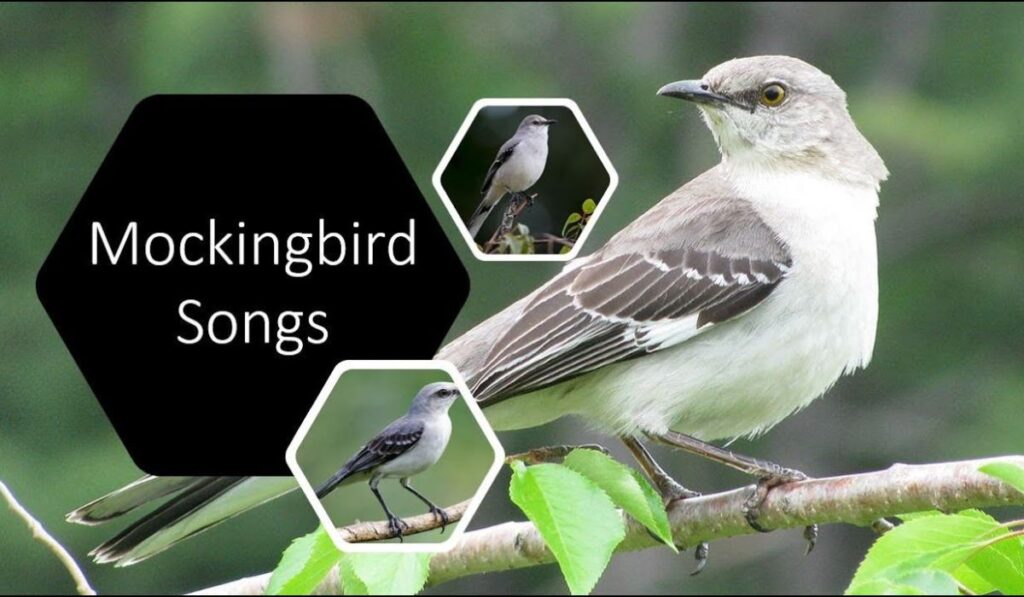Mockingbirds are fascinating creatures, known for their incredible vocal abilities and unique behavior of mimicking other birds.
These birds are often celebrated in various cultures, but their deeper significance in spiritual and biblical contexts provides a wealth of insight into their true meaning.
In this study, we will explore the biblical meaning of mockingbirds, unravel their symbolism, and analyze their deeper spiritual lessons.
We will also connect the mockingbird symbolism with other biblical themes such as innocence, praise, and imitation.
Birds in the Bible: Heavenly Messengers and Divine Symbols
Birds play an important role in biblical scriptures, frequently appearing as symbols of divine messages and spiritual truths.
In the Bible, birds are often linked to the idea of heavenly messengers, God’s care for creation, and spiritual qualities such as freedom and divine providence.
Birds as Spiritual Symbols
Throughout the Bible, various birds are used to represent virtues and spiritual messages:
- The Dove: Symbolizes peace and the Holy Spirit (e.g., in the story of Noah’s Ark, the dove brings back an olive leaf as a sign of God’s peace and renewal).
- The Eagle: Often associated with strength and divine protection.
- The Sparrow: A symbol of God’s care for the smallest creatures (Matthew 10:29).
- The Raven: Known for its association with God’s provision, particularly in the story of Elijah.
Each bird carries distinct qualities that reflect different aspects of the spiritual journey, making them rich in symbolism.
The mockingbird, in particular, is unique in its ability to mimic a wide range of sounds, which invites a deeper reflection on the role of imitation and worship in the life of believers.
The Mockingbird Role: Unveiling its Unique Biblical Significance

While the Bible does not directly mention the mockingbird, the bird’s qualities such as its mimicry and vocal abilities can be linked to various biblical themes.
The mockingbird’s imitation of other birds’ songs is symbolic of spiritual reflection and worship.
The Power of Imitation in Scripture
Imitation plays a significant role in the Christian faith. The Bible frequently encourages believers to imitate Christ’s love, virtue, and obedience.
In a way, the mockingbird’s mimicry of other birds can be seen as a spiritual metaphor for this act of adoration and emulation of God’s qualities.
- Ephesians 5:1-2: “Be imitators of God, as beloved children, and walk in love, just as Christ also loved you.”
- 1 Corinthians 11:1: “Be imitators of me, as I am of Christ.”
Just as the mockingbird imitates various sounds and melodies, believers are called to reflect divine love and imitate the qualities of Christ in their daily lives. The mockingbird’s song becomes a symbol of reverence and spiritual devotion.
The Symbolism of Song: The Mockingbird’s Call as a Spiritual Message
The mockingbird is renowned for its ability to mimic the songs of other birds.
This ability can be seen as a symbol of praise and worship in the biblical context. The Bible often connects song with spiritual rhythms and praise unto God.
Songs of Praise in the Bible
Music and song are frequently used in the Bible as expressions of praise, gratitude, and worship:
- Psalm 100:4: “Enter His gates with thanksgiving and His courts with praise.”
- Psalm 96:1: “Sing to the Lord a new song; sing to the Lord, all the earth.”
- Psalm 104:12: “The birds of the heavens sing among the branches.”
Like the mockingbird, which continuously changes its song, believers are encouraged to offer a new song of praise to God, reflecting the dynamic and ever-present relationship with the Creator.
This idea of the mockingbird song parallels the spiritual practice of praise and worship.
Imitation as Divine Inspiration: Lessons from the Mockingbird Mimicry

In addition to its vocal abilities, the mockingbird tendency to imitate other birds’ calls carries significant spiritual lessons.
In many ways, the mockingbird serves as a living metaphor for emulation and spiritual practice.
Emulating Christ: Imitation as Adoration
Imitation is not simply about copying; in a biblical context, it is an act of adoration and devotion.
The mockingbird’s imitation of other creatures can be seen as a reflection of the believer’s desire to emulate Christ and reflect His love, grace, and virtues.
- Matthew 11:29: “Take My yoke upon you and learn from Me, for I am gentle and humble in heart.”
- 1 Peter 2:21: “For to this you have been called, because Christ also suffered for you, leaving you an example, so that you might follow in His steps.”
In the same way, believers are called to reflect God’s virtue and faith in their actions and attitudes, much like the mockingbird reflects the songs it imitates.
This imitation as adoration deepens our connection with God and strengthens our spiritual walk.
The Innocence of the Mockingbird: A Symbol of Purity and Devotion
One of the most significant aspects of the mockingbird is its innocence. While the bird’s ability to mimic sounds may seem playful or trivial, there is a profound spiritual lesson in the bird’s purity and devotion to its craft.
Mockingbirds and Purity in Scripture
In the Bible, innocence is often associated with purity of heart and devotion to God. The mockingbird’s innocence can be seen as symbolic of the pure heart that pleases God:
- Matthew 10:29-31: “Are not two sparrows sold for a penny? Yet not one of them will fall to the ground apart from your Father. And even the hairs of your head are all counted. So do not be afraid; you are of more value than many sparrows.”
- Psalm 51:10: “Create in me a clean heart, O God, and renew a right spirit within me.”
The mockingbird, as an innocent and faithful creature, reminds believers of the importance of maintaining a pure heart and a humble spirit before God.
The Mockingbird and its Song: Symbolizing Our Relationship with God

The mockingbird’s vocal abilities are not just a wonder of nature; they also symbolize the spiritual rhythm between humans and God.
The song of the mockingbird can be seen as an offering of praise, an act of worship that mirrors the way humans are called to offer songs of praise to God.
A Symphony of Praise: Emulating God’s Creation
Just as the mockingbird’s song is a symphony of diverse sounds, believers are invited to create their own symphony of praise to God. This song of praise becomes a metaphor for the believer’s relationship with the divine.
- Psalm 96:1: “Sing to the Lord a new song; sing to the Lord, all the earth.”
- Colossians 3:16: “Let the word of Christ dwell in you richly, teaching and admonishing one another in all wisdom, singing psalms and hymns and spiritual songs, with thankfulness in your hearts to God.”
The mockingbird’s song serves as a reminder of the inspiration and joy that flows from a life of praise and worship.
Mockingbirds in the Old and New Testaments: Exploring Biblical Verses
While the mockingbird itself does not appear in the Bible, related imagery and biblical symbolism of birds can help us draw connections. Here are a few key verses where birds, like the mockingbird, may find symbolic relevance:
- Psalm 104:12: “The birds of the heavens sing among the branches.” This verse ties the mockingbird’s vocal abilities to the idea of divine praise, as birds often represent God’s creativity and provision.
- Isaiah 38:14: “Like a swallow or a crane, I chirp; I moan like a dove.” In this verse, bird imagery represents human emotions of distress and longing, which can be linked to the mockingbird’s varied calls as an expression of emotion.
- Matthew 10:29: “Are not two sparrows sold for a penny? Yet not one of them will fall to the ground outside your Father’s care.” This verse reminds us of God’s care for even the smallest creatures, reflecting the mockingbird’s place in His creation.
The Mockingbird and Harper Lee’s ‘To Kill a Mockingbird’: Bridging Literature and Faith
Harper Lee novel ‘To Kill a Mockingbird’ uses the mockingbird as a symbol of innocence and purity.
This literary reference aligns perfectly with the bird’s spiritual symbolism in the Bible, reinforcing the themes of moral lessons and justice.
Innocence and Morality in the Novel
In the novel, Scout Finch and Tom Robinson represent innocence that is vulnerable to the prejudices and immorality of society.
Similarly, the mockingbird in the novel symbolizes the destruction of innocence and the need for protection:
- Atticus Finch teaches his children to respect life and stand up for what is right.
- The mockingbird represents those who are harmed by societal injustices, paralleling biblical teachings on protecting the innocent.
Spiritual Lessons from the Mockingbird: Applying Biblical Teachings to Everyday Life

The mockingbird teaches us profound spiritual lessons about praise, innocence, and imitation.
By embracing these lessons, believers can live more virtuous and faithful lives, embodying the qualities that God desires.
Emulating Christ’s Love
The mockingbird’s imitation of other birds is a powerful reminder to emulate Christ’s love, humility, and devotion to others.
As the mockingbird reflects the songs of others, we are called to reflect Christ’s virtues in all aspects of our lives.
Freqeuntly Asked Questions
Biblical Meaning of Mockingbird
The mockingbird symbolizes innocence, purity, and the ability to imitate or reflect spiritual virtues, particularly in emulating Christ’s love.
Mockingbird Biblical Meaning
In the Bible, the mockingbird can represent praise, imitation of God’s virtues, and the harmony of spiritual worship.
Blue Mockingbird Spiritual Meaning
The blue mockingbird is often associated with protection, communication, and the divine expression of one’s true self.
Spiritual Meaning of Mockingbird
Spiritually, the mockingbird signifies joy, creativity, and the celebration of life’s diversity through mimicry and harmony.
Biblical Meaning of the Name Atticus
The name Atticus is linked to moral integrity and wisdom, often reflecting virtues found in biblical teachings about righteousness and justice.
Conclusion
In conclusion, the mockingbird serves as a beautiful symbol of innocence, imitation, and spiritual praise.
Through its ability to mimic and sing songs of devotion, the mockingbird reminds us of the importance of worship, humility, and emulating divine qualities in our own lives.
Just as the bird sings a song of praise to its Creator, we too are called to offer our lives as a symphony of devotion and love to God.
Let us take the mockingbird’s message to heart and strive to live lives of praise, virtue, and spiritual integrity.











